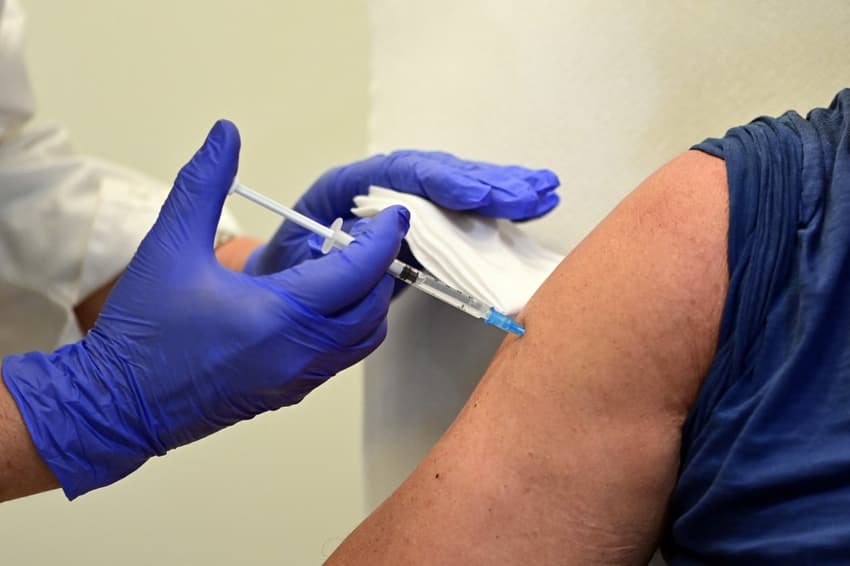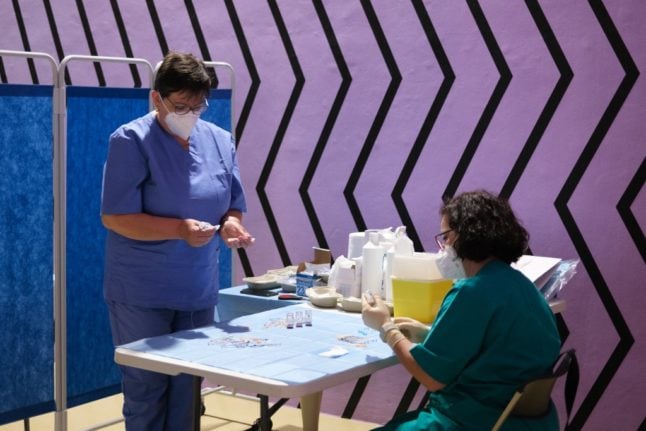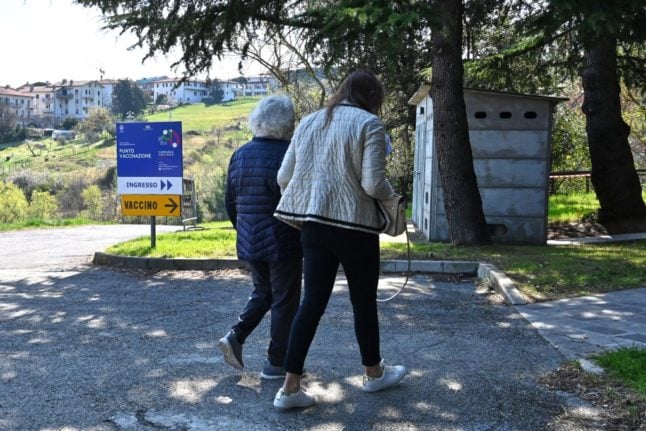What is Italy's Covid vaccination plan this autumn?

As Italy's health minister stressed that Covid vaccines remain 'crucial' to protect the vulnerable, here's what we know so far about getting your booster this autumn.
Covid is seemingly still slowing down in Italy, with the number of new cases currently down by 19.4 percent compared to last week.
But, as Health Minister Roberto Speranza said on Wednesday, vaccines are “still a crucial tool to protect the most at-risk [individuals]” in the fight against the virus.
READ ALSO: Italy gives green light to new dual-strain Covid vaccines
That’s why Italy will soon roll out its plan for the autumn vaccination drive, which, in line with European guidelines, will consist of a booster shot with increased efficacy against the new Covid variants.
Vaccination will not be mandatory, with the decision on whether or not to get the jab expected to be left to the public’s discretion and no plans for the reintroduction of the 'green pass' so far.
Though no definitive blueprint has been released yet and additional details are expected to be disclosed in the following days, the framework of the upcoming campaign has already been partly outlined by a ministerial memo published on Thursday and a press conference held by Nicola Magrini, director general of the Italian Medicines Agency (Aifa), on Friday.
Here’s what we know so far about Italy’s autumn jab drive so far.
What vaccines will be administered?
The Comirnaty (Pfizer) and Spikevax (Moderna) dual-strain vaccines will be at the centre of the next vaccination campaign.
Both vaccines were approved by the Italian Pharmaceuticals Agency (AIFA) on Monday and by the European Medicines Agency (EMA) on Friday of last week.
As suggested by their name, the newly approved vaccines are bivalent, meaning that they are effective against both the original Wuhan strain and the more recent Omicron variants (BA.1, BA.4, BA.5).
The dual-strain vaccines have been shown to “generate an antibody response against the Omicron BA.4 and 5 variants", which currently represent “96 percent of all strains isolated in Italy so far”, Magrini said.
Who will the next vaccination campaign be for?
According to the latest memo from the Italian health ministry and Magrini's words on Friday, the new bivalent vaccines will be offered first to those at-risk patients, i.e. people over the age of 60, healthcare workers, care home residents and pregnant women, who haven’t yet received a second booster shot (fourth dose overall).
In a second stage, the autumn jab campaign should be expanded to encompass any individual over the age 12 who has only completed a single vaccination cycle. For this category of people, the new booster shot would be the third vaccine dose overall.
READ ALSO: At a glance: What are the Covid-19 rules in Italy now?

The new dual-strain vaccines will be offered first to at-risk patients, including people aged over 60 and care home residents. Photo by Marco BERTORELLO / AFP
It should be noted that, irrespective of the above categories, the booster shot will only be administered to people who received their last vaccine dose at least 120 days (about four months) prior to the new jab.
When will it start?
Italy's autumn vaccination campaign will officially start next week, with most regional booking services being available to the public starting from Monday, September 12th – bookings for Trentino Alto Adige residents will open as early as Saturday, September 10th.
Additional information about regions' individual vaccination programmes are expected to be released in the following days.
READ ALSO: Italy to open Covid booster jab bookings from Monday
Earlier this week, Italian newspaper Repubblica suggested that the country’s local health authorities (ASLs) might choose to make the Covid vaccination campaign coincide with the annual flu jab campaign, with both shots being potentially administered at the same time.

Covid vaccination hubs might be set up provided that there is sufficient demand for the new booster shoot. Photo by Andreas SOLARO / AFP
There are currently no indications that the Italian government is planning on going down said route.
However, once again, it is likely that further details about the upcoming national vaccination programme will emerge in the next few days.
How will it work?
As in the case of the previous vaccination campaigns, each regional health authority will be required to abide by the guidelines set out by the health ministry but will be given broad powers over the management of their own local vaccination programmes, including their timing.
READ ALSO: Where and how to book a Covid-19 vaccine booster shot in Italy
Friday's press conference confirmed that general practitioners and pharmacies will once again be heavily involved in the vaccination campaign. Vaccine hubs might also be built in densely populated areas provided that there is sufficient demand.
Finally, bookings will work in pretty much the same way as before, with patients being able to book their appointments through GPs, pharmacies or their ASL’s website where available.
For further information on regional authorities’ online reservation platforms, see the official vaccination booking website.
Comments
See Also
Covid is seemingly still slowing down in Italy, with the number of new cases currently down by 19.4 percent compared to last week.
But, as Health Minister Roberto Speranza said on Wednesday, vaccines are “still a crucial tool to protect the most at-risk [individuals]” in the fight against the virus.
READ ALSO: Italy gives green light to new dual-strain Covid vaccines
That’s why Italy will soon roll out its plan for the autumn vaccination drive, which, in line with European guidelines, will consist of a booster shot with increased efficacy against the new Covid variants.
Vaccination will not be mandatory, with the decision on whether or not to get the jab expected to be left to the public’s discretion and no plans for the reintroduction of the 'green pass' so far.
Though no definitive blueprint has been released yet and additional details are expected to be disclosed in the following days, the framework of the upcoming campaign has already been partly outlined by a ministerial memo published on Thursday and a press conference held by Nicola Magrini, director general of the Italian Medicines Agency (Aifa), on Friday.
Here’s what we know so far about Italy’s autumn jab drive so far.
What vaccines will be administered?
The Comirnaty (Pfizer) and Spikevax (Moderna) dual-strain vaccines will be at the centre of the next vaccination campaign.
Both vaccines were approved by the Italian Pharmaceuticals Agency (AIFA) on Monday and by the European Medicines Agency (EMA) on Friday of last week.
As suggested by their name, the newly approved vaccines are bivalent, meaning that they are effective against both the original Wuhan strain and the more recent Omicron variants (BA.1, BA.4, BA.5).
The dual-strain vaccines have been shown to “generate an antibody response against the Omicron BA.4 and 5 variants", which currently represent “96 percent of all strains isolated in Italy so far”, Magrini said.
Who will the next vaccination campaign be for?
According to the latest memo from the Italian health ministry and Magrini's words on Friday, the new bivalent vaccines will be offered first to those at-risk patients, i.e. people over the age of 60, healthcare workers, care home residents and pregnant women, who haven’t yet received a second booster shot (fourth dose overall).
In a second stage, the autumn jab campaign should be expanded to encompass any individual over the age 12 who has only completed a single vaccination cycle. For this category of people, the new booster shot would be the third vaccine dose overall.
READ ALSO: At a glance: What are the Covid-19 rules in Italy now?

It should be noted that, irrespective of the above categories, the booster shot will only be administered to people who received their last vaccine dose at least 120 days (about four months) prior to the new jab.
When will it start?
Italy's autumn vaccination campaign will officially start next week, with most regional booking services being available to the public starting from Monday, September 12th – bookings for Trentino Alto Adige residents will open as early as Saturday, September 10th.
Additional information about regions' individual vaccination programmes are expected to be released in the following days.
READ ALSO: Italy to open Covid booster jab bookings from Monday
Earlier this week, Italian newspaper Repubblica suggested that the country’s local health authorities (ASLs) might choose to make the Covid vaccination campaign coincide with the annual flu jab campaign, with both shots being potentially administered at the same time.

There are currently no indications that the Italian government is planning on going down said route.
However, once again, it is likely that further details about the upcoming national vaccination programme will emerge in the next few days.
How will it work?
As in the case of the previous vaccination campaigns, each regional health authority will be required to abide by the guidelines set out by the health ministry but will be given broad powers over the management of their own local vaccination programmes, including their timing.
READ ALSO: Where and how to book a Covid-19 vaccine booster shot in Italy
Friday's press conference confirmed that general practitioners and pharmacies will once again be heavily involved in the vaccination campaign. Vaccine hubs might also be built in densely populated areas provided that there is sufficient demand.
Finally, bookings will work in pretty much the same way as before, with patients being able to book their appointments through GPs, pharmacies or their ASL’s website where available.
For further information on regional authorities’ online reservation platforms, see the official vaccination booking website.
Join the conversation in our comments section below. Share your own views and experience and if you have a question or suggestion for our journalists then email us at [email protected].
Please keep comments civil, constructive and on topic – and make sure to read our terms of use before getting involved.
Please log in here to leave a comment.